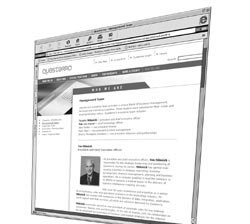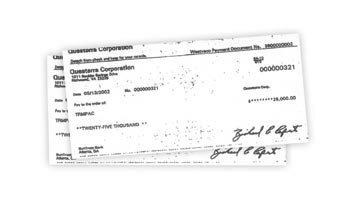Indicted, hiding: Local company in Texas scandal
For a recently formed company, Charlottesville-based Questerra wasted no time in getting in trouble... in Texas.
The story of the company's difficulties rose to national notoriety on September 21 when a grand jury indicted three top aides to House Majority Leader Tom DeLay for money laundering and illegal fundraising.
Questerra is among eight companies also charged with making illegal political contributions to DeLay's pet PAC, Texans for a Republican Majority (TRMPAC).
Did Questerra execs know that it's a no-no for corporations to contribute to Texas legislative candidates, which is where TRMPAC funnels its funds? And why is a Charlottesville company so interested in Texas races that it would write checks totaling $50,000?
"At this point, we're not allowed to comment because of ongoing proceedings," says Lisa Stokes, director of human resources for Questerra, which has offices in the Omni hotel. Stokes refuses to identify Questerra's lawyer.
"That's odd; it's the only business that doesn't have an attorney listed," says clerk of court Linda Estrada in Travis County, Texas, where the two counts of felony unlawful political contributions against Questerra were filed.
Since the indictments were handed down, Questerra's management team has disappeared from its website. Thanks to the miracle of "caching" on Google, the Hook was able to glimpse its CEO and president Tim Milovich, who does have some Texas ties: He used to work with Ross Perot's Perot Systems, which is headquartered in Plano, Texas.
In making allegedly illegal donations, Questerra finds itself in the company of some biggies: Sears, Bacardi, Cracker Barrel, Westar Energy, Diversified Collection Services, Williams Companies, and the Alliance for Quality Nursing Home Care Corporation, which coughed up a whopping $100,000.
Questerra wrote two $25,000 checks to TRMPAC in May and August 2002, which sent $190,000 to the Republican National Committee, where it was allegedly laundered and sent to the Republican National State Elections Committee. That group distributed funds to 20 Texas House candidates, according to the Washington Post.
It's no secret DeLay has wanted a Republican majority in the Texas legislature, long dominated by Democrats, to give the Lone Star State more Republican-leaning congressional districts. In fact, Democrat legislators fled the state twice this spring to deny a quorum and block a redistricting vote.
Founded in 2001, Questerra is a subsidiary of paper giant MeadWestvaco, and it markets 21st-century mapping technology.
Who made the decision to donate big time to Texas legislators– and allegedly court DeLay's favor?
"I'm sorry, I really can't comment on that," says Donna Cox, MeadWestvaco's director of communications.
Homeland security is an obvious client for Questerra's intelligence-based maps. Using longitude and latitude readings, it's possible to "determine the intersection of multiple data sets together, producing invaluable information never before available," CEO Milovich told the Homeland Defense Journal in March 2003.
For example, a federal agent can pull up certain passport holders who've gotten traffic tickets within five miles of a power plant, Milovich said.
The Texas Republican Majority is not the only beneficiary of Questerra largesse. The company also wrote a $25,000 check to the Republican Governors Association and gave $20,000 to the Republican State Leadership Committee.
Corporate political soft-money contributions are loosely legislated– if at all. A group wanting to change that, the Center for Political Accountability, has joined shareholders in asking the U.S. Securities and Exchange Commission to require publicly traded companies to disclose soft-money, "527" contributions, such as those to DeLay's Texans for a Republican Majority.
"We have been mounting a campaign to push companies to one, disclose contributions, two, explain the business purpose of them, and three, identify the corporate officers who made the decision," says Bruce Freed at the Center for Political Accountability.
"It's our policy to comply with the letter of all campaign laws and regulations," says MeadWestvaco's Cox. Questerra's parent company handed out $1,000 in 2002 to the American Forest and Paper Association PAC.
"It's very interesting that MeadWestvaco does very little soft-money contributions, and Questerra gave $50,000," says Freed. "That's some serious money." And it's double what the much larger Sears donated.
One other thing bothers Freed. "Here you have this company based in Virginia, and they're contributing to races at the state level in Texas. Why did they do it?" he asks. "I think that's a very important question."

The web page with Questerra execs was taken down soon after the indictments for illegal campaign contributions were handed down.
FROM THE QUESTERRA WEBSITE

A company headquartered in Charlottesville was so interested in Texas legislative races that it contributed $50,000 dollars to House Majority Leader Tom DeLay's favorite PAC.
COURTESY TRAVIS COUNTY CLERK'S OFFICE
#